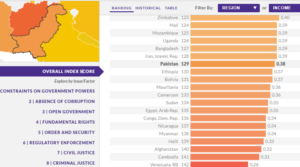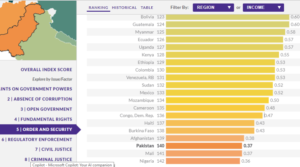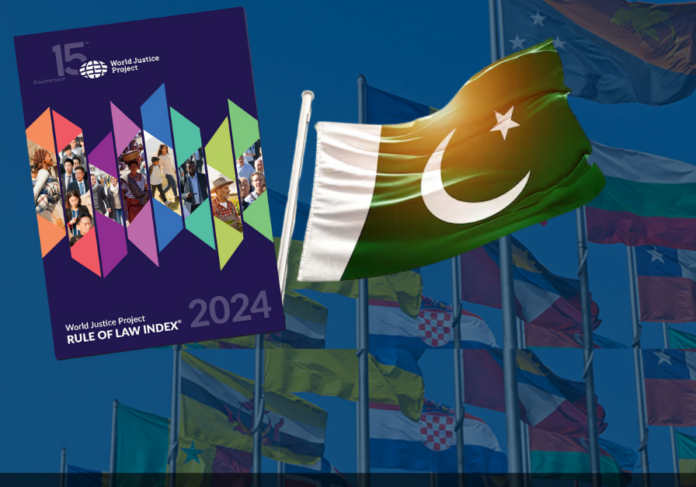The World Justice Project Rule of Law Index 2024 report has spotlighted Pakistan’s struggle with law and governance, ranking the nation as third-worst globally out of 142 countries. This concerning assessment highlights severe deficiencies in public safety, justice, and institutional accountability, casting light on key areas where reforms are critically needed.
Global Ranking and Key Indicators of Concern
According to the World Justice Project Rule of Law Index 2024, Pakistan is placed 129th overall, with particularly low scores in Order and Security (140th), where only Mali and Nigeria fared worse. This low ranking reflects Pakistan’s challenges in maintaining crime control, public safety, and effective conflict resolution mechanisms.


Additionally, Pakistan’s performance on eight core indicators showed room for improvement, underscoring its need for stronger governance and accountability mechanisms:
- Constraints on Government Powers: Ranked 103rd
- Absence of Corruption: Ranked 120th
- Open Government: Ranked 106th
- Fundamental Rights: Ranked 125th
- Order and Security: Ranked 140th
- Regulatory Enforcement: Ranked 127th
- Civil Justice: Ranked 128th
- Criminal Justice: Ranked 98th
All Above mentioned Pakistani Ranking in different areas and for other countries ranks in all areas can be accessed here at World Justice Project Index 2024.
Regional Comparison
Among South Asian countries, Pakistan and Afghanistan share the lowest rankings on the World Justice Project Rule of Law Index 2024, underscoring region-wide challenges in maintaining law and order and protecting citizens’ rights. Pakistan’s rank, significantly below other nations in the region, reflects deep-rooted issues that demand sustained attention to improve transparency, regulatory enforcement, and institutional accountability.
A Global Decline in Rule of Law
The World Justice Project Rule of Law Index 2024 highlights a concerning global trend: rule of law has declined for the seventh consecutive year. This year’s report identifies three key drivers behind the global decline:
- Executive Overreach: The unchecked expansion of executive powers continues to undermine the balance of governance.
- Deteriorating Human Rights: Countries across all income levels are witnessing an erosion of fundamental rights.
- Underperforming Justice Systems: Inadequate resources and outdated practices hinder justice systems from meeting public demands effectively.
Positive Notes
While the World Justice Project Rule of Law Index 2024 acknowledges a widespread decline, there are encouraging signs of progress in corruption control and justice reform. Over half of the countries surveyed reported improvements in their Absence of Corruption scores.
For the first time in five years, 59% of nations showed gains in reducing corruption, suggesting positive momentum. The report also notes that several nations have made strides in strengthening criminal justice systems, with particular progress noted in the speed and transparency of case handling.
Comparative Insights
In stark contrast, high-income nations such as Denmark, Norway, Finland, Sweden, and Germany dominated the top spots in the World Justice Project Rule of Law Index 2024. These countries, with stable legal frameworks and robust checks on executive power, serve as models for countries struggling with governance and rule of law challenges.
The report closes with an urgent call to action, stressing the importance of ongoing global efforts to restore and reinforce rule of law principles. William H. Neukom, co-founder and president of the World Justice Project, emphasized the need for a renewed commitment to law and governance.
He noted, “After seven consecutive years of rule of law declines, it can be easy to focus on the negative. But to do so would ignore accomplishments in anti-corruption and the hard work occurring to improve justice systems globally.”
Pakistan’s Path Forward
The World Justice Project Rule of Law Index 2024 provides a roadmap of challenges and areas for reform in Pakistan’s law and governance. To address these critical gaps, Pakistan will need to invest in strengthening regulatory enforcement, enhancing public safety measures, and rebuilding trust through transparency and anti-corruption efforts.
With continued focus and support from both domestic and international communities, Pakistan can work toward reversing these trends and ensuring a more just and secure future for its citizens.


